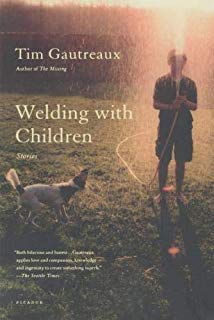 By Jhareese Walker Tim Gautreaux is a novelist and short story writer who was born in 1947 in Morgan City, Louisiana. Some of his published books are: The Missing, The Clearing, and Welding with Children. In an interview with Dayne Sherman, An American journalist, Gautreaux said, “I just learned along the way that writing comes from living. Living doesn’t come from writing. The best way to learn how to write about children is to have a couple of your own” (Sherman). Gautreaux exemplifies this mindset in his book Welding with Children published by Picador in 1999. Welding with Children is a collection of eleven short stories that have a common theme of portraying the lifestyle of a southern working-class families. There were a few stories that really intrigued me, but there was one story in particular that stood out to me more than the others. The short story “Welding with Children” is a great story simply due to the self-realization the main character experiences throughout the story. Bruton, the grandfather in the story, serves as his own life lesson. By watching the four children of his own children, he finds himself in need of some self-improvement once he notices that the actions of the children are the product of their parents’ standards. By the end of the story, Bruton attempts to turn the children to God: “’Does your mamma ever talk to y’all about, you know, God?’ ‘My mamma says God when she’s cussing Melvin,’ Tamynette said.” (Gautreaux 8). While not having done the greatest job of raising his own children, he wants to do better by his grandchildren. A few things that I like about the text was the southern dialect that Gautreaux included within the story. He seems to include a little of himself and his heritage throughout the whole text. Also, in another short story called “Easy Pickings”, Gautreaux writes about an old lady who gets robbed by a man that goes by the name of Big Blade: Big Blade growled, giving the old woman a push toward her screen door. ‘I want your money’…’Well, I be damn. Ain’t you got nobody better to rob than an ol’ lady whose husband died twenty-nine years ago of a heart attack in a bourrée game holding ace, king, queen of trumps?’” (Gautreaux 63). Many of the stories in his collection are unique scenarios which make each story fun to read. Many people might enjoy this text because each story can be fun to read even for the students that don’t usually like reading. Each storyline in the collection is unique which instantly can draw the reader to the story. Not only can it be fun to read, but there are life lessons that can be taken from each of these stories. Being able to read a text that is fun, yet possesses the capabilities to be informative, is special and is not something that every book can do.
0 Comments
Leave a Reply. |
Archives
April 2021
Categories |
- Home
- About
-
Issues
-
2024 cover page
>
- Editors' Note (2024)
- Fifty-two Minutes
- The Day I Love Myself More Than You
- Shadows
- Bloodlust: The Metamorphosis
- picture this
- rite of passage
- Bathroom Floor
- Cat
- M
- 삼년상 (Sam-Nyun-Sang)
- Valley
- I'm More Than
- I'm Not a Toy
- Rising Phoenix
- Grow
- Canvas
- red :3
- Green Cousins
- The Lighthouse
- Sea of Plants/Planets
- Kitty's Poem
- Fin
- tomie
- Library Class
- Our Lie
- Weavers
- An Old Tree
- A World Without You
- All Must Die
- Flower
- The Canoe
- It's Scary Up Here
- Beautiful Things
- Ma Vie
- The Final Wall
- Hosts
- Waqe Zhiga
- two faced feelings
- imposter syndrome
- Feminism
- Pretty Girls
- It's Just Us
-
See You in Another World (2023)
>
- Editors' Note (2023)
- Voices of the Summer Night
- Lightning Glut
- All The Little Things
- From a Distance
- Confined
- The Night Hours
- A Contrapuntal for the Girl in My Dreams
- Go Back (before they do)
- Snippet of Thought
- The Darkness
- Her Nature
- I Listen
- Stranger In The City
- What Music Does
- Fallen Stranger
- The Black Dress
-
A Fire of Words (2022)
>
- Editors' Note (2022)
- The Floor Wallows Lower
- Cornflowers
- Erudite
- That One Morning
- mom, im afraid
- selenophilia
- Roses and Rainbows
- If a poisonous snake bites itself, will it die?
- Rochester
- Crown of Branches
- Stairs to the Sea
- A Poem Written Entirely From Advertisements
- Pyromania
- silhouette of a bird against winter stars
- thunderstorm in the bedroom
- A Night in Recovery
- sleeping gypsie
- paper dolls&goodbyes
- We Are Women
- Village Air
- Sunshine's Laughter
- the male gaze
- The Forensic Entomologist
- Lacking
- Drowning
- Adelie
-
Create the Wonders We Dream (2021)
>
- Editors' Note (2021)
- Zove
- I'm Sorry
- Fake Smile
- My Friend the Balloon
- Eyes Intertwined
- Perfect
- Only a Moment
- A Dangerous Word
- My Dreams
- The Last 100 Meters
- The Green Void (Villanelle)
- The Whimsical Galaxy (Sestina)
- The Silent Kindness
- Pressure
- Table on the Hill
- The Yukon
- The Shore
- Repentance
- Her and I
- Infections of the Soul
- Threads
- Dream of a High Schooler
- Empty
- little flame
- scars
- black and white
- The Cat
- Joy
- Sweet Honey Bee Stings
- If There Were One Day
- Delete
- Our Hearts to Central Vietnam
- him or Him?
- Ocean
- Es Llaner Beach
- Sewn Together
- Rain
- Yes, I Like
- The Legacy of the Moon
- The Wind Whimpers
- From Here I See
- To Feel Clean
- Red
- Survival
- Substance
- Golden Lies
- Midnight Tango
- Ode to a Spleen
- Modern Siren
- The Night's Diamond Tears
- Beats In Double Time
- A Day in the Flight
- Carved By Venus
- Lifeline
- Everest
- Education
- How Much of Reality Can Be Observed
- What is a Spork
- What is the difference between love and in love
- What would you have wanted? me to say
- Planet Caravan
- The Journey of a Minute
- The Circus of Scars
- Mosaic
- Color
- Love and Acceptance
-
Colors I Never Knew Existed (2020)
>
- Editors' Note (2020)
- Two Weeks' Notice
- A Curious Man
- An Eternity Swathed in Cobwebs
- Hidden Memories: A Villanelle
- A Better Place
- Conscription
- Just Breathe
- Akko
- The Hungry Dark
- And Then Something Shuffled
- Deodorants are a Girl's Best Friend
- The Old House
- Willow
- Perfection
- She Will Be Queen
- Nothing But Space
- a wicked thing
- Anthony
- Cheesecake
- Za
- Coco
- Coexist
- der böse Mann
- Feeding
- Catharsis
- I HAD TO RENAME THIS POEM DUE TO COPYRIGHT ISSUES
- For All The Kids Who Were Told They'd Never Make It... and Believed This
- i Will Always Love You
- Our 4
- Rainy Day
- Space
- The Ocean Cares Nothing of Man
- Sickly Sweet Love
- I call the eating disorder hotline
- Bright and Sunny Day
- Grandma in the Moon
- Interminable Education in Seventeen Syllables
- Macrocosmic Creation
- Middle Class Psyche
- My Sister
- From a Park Bench
- Rain
- A Recollection of Our Memories
- Sadie Got Me in My Feelings
- Uranium Rose
- When I Grow Up - Paige Rhoads
- Who am I?
- 49-53
-
Words Become Reality (2019)
>
- Editors' Note (2019)
- Bear Down: A Sestina
- Kidnapped & Killed
- Lemonade
- Rise
- Someone Who always Pays
- A Simple Story
- The King's Battle
- Aftermath
- Aging Population
- Can we still be friends?
- Carpe Diem
- Coffee
- Day to Day
- Do Not Hold me Closer, Let me Go
- Gift of Time
- Love Everlasting
- A Message to the Youth
- Peach
- Waiting for the Bell
- Randy
- The River & The Earth
- The Show Goes On
- Summer Love
- Sundae
- West Coast Wishing
-
Watch Every Second (2018)
>
- Editors' Note (2018)
- White
- eleven eleven
- Growing Up
- Claustrophobia
- The Cage
- The Soldier's Return
- Spacing Out
- Depression
- Mona Lisa
- Childhood Cancer
- Puberty
- Languish
- A Magical Ending
- Life
- Barter
- Descent into Space
- Red Water
- The Short Film
- Starting Line
- And I Am From?
- Such a Foreign Concept
- You Say
- My Creator
- The Most Common Illness
- Reflection in Time
- Ode to My Mirror
- Time
- See Me
- Consequences
- Where I'm From
- Unstoppable
- Her Voice Remains (2017) >
-
2024 cover page
>
- Blog
- Submit
- Contact

 RSS Feed
RSS Feed